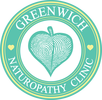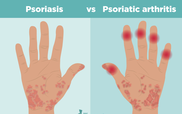|
Psoriatic arthritis affects 30% of people with psoriasis and is classed as another kind of arthritis. It commonly occurs between ages of 15-35. In healthy skin, it normally takes around 28-40 days for new cells to move from the deepest layer of the epidermis up to the surface. Once the cells reach the top layer they naturally mature, becoming more rough, dry and flaky. In psoriasis the process only takes a few days resulting in the build up of dead skin cells and thick scales . Typical symptoms of psoriatic arthritis include:Joint pain, Tenderness, Swelling in the fingers, toes, or spine. Reduced range of motion, Morning stiffness, Redness and pain of the eye that is similar to conjunctivitis, Nail changes with pitting or lifting of the nail. Psoriatic arthritis is associated with bone erosion and deformities that affect half of the people with this disease. Skin and joint symptoms may flare up or improve simultaneously. Allergy, intolerance and sensitivity underpin over reactive immune systems typically found in autoimmune mediated diseases. The most common triggers or allergens we observed in clinical practice include ; Milk, Cheese, Casein, Lactic acid, Yogurt, Whey, Butter, Vitamin D, Vitamin C, Sodium Chloride (table salt) Chocolate, Coffee, Caffeine, Wheat Night shades ( potato, tomato, aubergine pepper) Salicylate phenolics particularly from onion Fatty acids Environmental culprits Include: Washing up liquid, Latex, Plastics Pesticides Case study For 15 years, a 35 year-old female had psoriasis all over her body along with severe arthritis of the joints affecting mobility of her hands. She was taking vitamin D supplementation and drinking milk with her tea three times a day even though she never used milk products in any other form. After she was tested and treated for milk and milk products, along with Vitamin D, her psoriasis disappeared and her health greatly improved. The body can be intolerant to natural and unnatural substances. Once it becomes intolerant it is not able to absorb or assimilate nutrients from these items. The natural approach Identifying triggers and then temporarily remoe them while fixing the immune response (using a personalized protocol ). Then integrating natural medicine can help reduce and prevent further inflammation. Common natural medicines that can be helpful in psoriasis (assuming there is no intolerance to these factors) Essential fatty acids/Evening primrose/ borage/fish oils/ turmeric/ curcumin/ bromelain/ quercetin. All these work on these anti inflammatory pathways. This website does not provide medical advice. The information including, but not limited to text, graphic and images, and other material contained on this website are for informational and educational purposes only. No information on this site is intended to be a substitute for professional medical advice, diagnosis or treatment. Always seek the advice of your physician or other qualified health care provider with any questions you may have regarding a medical condition or treatment and before undertaking a new health care regime and never disregard professional medical advice or delay seeking it because of something you have read on this website.
0 Comments
Leave a Reply. |
AuthorNaturopath Nutritional and Herbal Medicine Therapists Providing support & programmes designed to restore health & optimise wellbeing. Archives
December 2023
Categories |


 RSS Feed
RSS Feed
